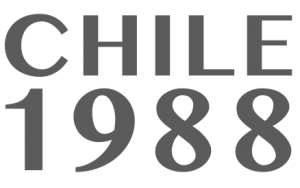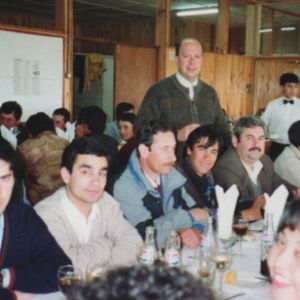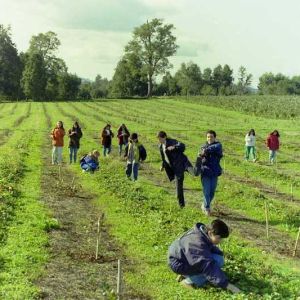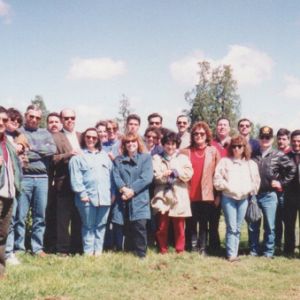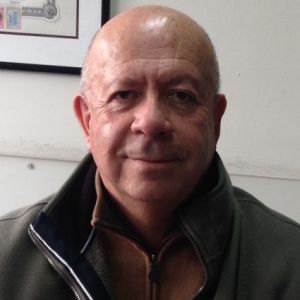Plutarco Dinamarca
Transcription
We’re going to refer to the plebiscite on October 5, 1988, but before that, I need to provide some background information on that day. In 1985, my wife María de la Luz and I, while I was a project manager in the Agroindustrial Department of Fundación Chile, which was a partnership between the Chilean government and ITT Corporation, had the task of developing a project related to the introduction of fruit farming in southern Chile. In the south of Chile, there was a lot of livestock and various crops, but commercial fruit farming was not well established. There were only a few home orchards and such. I specialized in smaller fruit crops within the field of agronomy, just as there are major fruit trees that are trees, there are minor fruit trees, which are bushes, such as blueberries. So, we brought blueberry cultivation to Chile. I introduced the cultivation of blueberries to Chile. At that time, we also brought varieties to the south of Chile, the varieties of raspberries that today occupy 99 percent of the surface, the blackberries without thorns, the thornless evergreen blackberries. Currants like black sarsaparilla, red sarsaparilla, all the species of minor fruit trees we established in a larger plantation of which and which was the first in Chile. There was no other, of which I was the general manager, but more than that it was the technical adviser who did the training for people, because in the south people did not even know how to handle pruning shears.
During the harvest season, which took place in summer, we employed women from the local community who otherwise had limited job opportunities as most jobs were reserved for men. It created a positive cycle where women worked from December to March, sometimes even April, and the ones that were students had permission from their parents according to the law. As March approached, the time for studying, they would leave, and the harvest would also start to decline. There came a point when the women in the households earned more income than the men. They began setting conditions, such as not allowing the men to come home drunk, behave properly, and not be abusive. From 1985 to 1988, I was a key figure in a significant social reform or change. In addition to transforming the landscape of southern Chile, where you would typically see pastures, cows, and crops, but never rows of these specific crops. Since that time, the landscape of southern Chile started to change, and people’s awareness began to shift as well.
Going back to the plebiscite, I was never a friend of the military, never. However, with that experience, I realized, I was referring to the military government. I have friends who are in the military, but I was never a friend of the military government. I never worked for the military government. But I noticed that in 1985, when I became the general manager of that company, I was 30 years old and my wife and I had four children. In 1984, Santiago was filled with protests. On one occasion, I was attacked during a street protest and I was beaten. I said to myself, “This is not what I want for my children.” So I had a conversation with my wife and told her that we had started this project and we were looking for a general manager. I expressed my desire to go there and get this project up and running, at least during the trial period, because it was like my own child, and no one would be better suited for the job than me. Nobody had the technical and commercial knowledge, which I had acquired long before. So we went there. During the Easter holidays of 1985, my wife and our four children, and later another child was born, went there and started working on this project. In different circumstances, I believe that in a situation like the present one, it would have been much more difficult because at that time there was order, there was discipline. I created a union, and I almost got fired from Fundación Chile for creating a union within the company. The other subsidiaries of Fundación Chile, which employed many people like
us, up to 600 people in the summer, wanted nothing to do with unions. I believed that the union was the best way to communicate with people, and I still think that way today. But there were people who were more conservative in that regard and didn’t want to go along with it.
So, when the plebiscite came, I didn’t participate much in politics. However, everyone knew that by that time, in southern Chile, I represented a new idea. I’m talking about those years, the late ’70s. In those years, Chile exported one million dollars’ worth of berries, mainly frozen. Today, it exports over a thousand million dollars’ worth. And that company had a lot to do with this development. It doesn’t mean that we were solely responsible for it because there were many other companies and individuals involved. But it filled me with satisfaction and pride because I studied in a public school, I attended a high school in Instituto Nacional, and I studied at the University of Chile, and it was always free. What they taught us was that there was a lot of academic rigor. It was difficult to get into Instituto Nacional, but it was even more challenging to graduate. It was difficult to get into the University of Chile, but it was even harder to leave with a degree. Two hundred students entered, and only 35 graduated. In 1971, there were 75 of us, but only 35 of us graduated, and it was all free. So, having received all of this education, there was a social commitment to the people. One was worry about how I would pay for all this education that was given to me. And my work, within the economic framework that existed in our country at that time, the political order, things that one appreciates, and the social aspect where I saw that people were gaining more power in the sense that they were acquiring more resources, as I explained regarding women compared to men. I witnessed that change, and I was part of that change. So, in the end, I identified myself clearly with this regime.
Well, as political parties were formed and such, we lived in the city of La Unión. La Unión had around 35,000 inhabitants at that time in 1988, and my wife, our children, and I had bicycles. So on Sundays, they organized a bicycle ride for the “Yes” campaign in La Unión, and we would join. I had a tandem bike, with me in the front and my wife in the back, and our four or five children surrounding the bike like chicks. We became well-known for being in favor of the “Yes” campaign. In a small city like La Unión, the influential people who made decisions, such as lawyers, accountants, and others, knew who was who and which side they were on. I always stood on the side of “Yes.” I would put signs on my truck, and in my house, I displayed signs so that there was no doubt about my stance.
More than General Pinochet himself, what I liked was the political, economic, and social model, and above all, the order. In that city, I, well, I wasn’t forced because I volunteered, but they appointed me as a polling station officer, and then, among the different polling station officers, they elected me as the president of the polling station. After I was elected as the president, they told me that this was one of the many polling stations they had identified throughout Chile to deliver the vote count as soon as possible, for statistical purposes and to project what would happen. So I was elected as the president. My task was to count the votes on that day as quickly as possible because there was a bigger matter at hand, and that’s what I did. The election process took place without any alteration or cheating. I wouldn’t have accepted anything like that, even if they had asked me. I wouldn’t do it under any circumstances, and no one ever asked me to.
Well, we began the vote count. It was the first polling station. It was the first polling station that closed, you know? And we did the count, and in our polling station, the “Yes” campaign won, but by a very small margin. Let’s say it was 51% to 49% or something like that. It left me disheartened and very concerned because I thought, “If here, in this city with all the economic activity generated, with so many people
who have climbed a few steps or improved their income individually or as a family, if we achieve this result, it means it will be even worse elsewhere.” We submitted the results, and well, we stayed there wandering around in the school building, the school in La Unión, and then I went home to watch television. And as we all know, the numbers were being announced, sometimes in favor of the “Yes” campaign, and then other numbers were presented against it, in favor of the “No” campaign. It was a bit of a foggy night because the higher authorities of the nation didn’t want to release the results quickly.
But when General Matthei conceded defeat or conceded victory to the “No” campaign at La Moneda Palace, it caused a mental short circuit in me from which it took me a long time to recover. Even until this day, after all these years, I still can’t understand how a model that was bringing so much prosperity to many people, purely economically, not necessarily in other aspects or important aspects of human life, but economically, which was what we were going to do there, it was not enough for that model to be maintained. That has been hard for me to understand to this day. Human rationality has many more variables. Inputs if you will have many more variables than one is capable of considering..
And well, once it was known that the “No” campaign had won that plebiscite, there were presidential elections that followed, right? Other individuals participated in those elections. Hernán Buchi, who was my classmate at the Instituto Nacional, was the presidential candidate at that time. But it wasn’t the same as maintaining a model like the one we had. People who are right-leaning, like myself, consider ourselves right-wing, not centrist. Generally, we greatly value freedom. That government not only took us out of a subjugation scheme. I entered university in 1971 when Allende assumed office on November 4, 1970. I was chosen as the best classmate at the Instituto Nacional, and Allende presented me with the award because he was an alumni of the Instituto Nacional. The ceremony took place at the Municipal Theater of Santiago on September 22, 1970, and at that time, we all had high hopes for Allende. Our hearts were open, especially the young people, hoping that everything would improve and change, that there wouldn’t be so much poverty, and so on. So we ended up with a hug. However, in 1971, at the School of Agronomy at the University of Chile, I spent the first half of my student period under the government of the Popular Unity and the second half under the military government. The difference was remarkable. During the first half of my studies, there was the Vietnam War, where even if Ho Chi Minh sneezed, they would occupy the faculty, or if anything happened to Che Guevara in Bolivia, there would be unrest. There were no classes, nothing. But during the second half under the military, there was no disorder. It was all about studying, studying, and studying, and woe to anyone who stirred up trouble or bothered people. I liked that a lot. After all the chaos and disorder, where any fool decided my fate, telling us what to do, what not to do, whether we could study or go on field trips for practical training. With the military, that ended. It became about studying. As a provincial person who loves freedom and order and values individual initiative, which are the three main characteristics of right- leaning people, regardless of their cultural, moral, and ethical aspects, let’s say. Because if I love freedom, I have to allow communists in the system, right? I have to allow all kinds of people, and I have to defeat them through my actions and ideas, not through the subjugation that existed on both sides during that time.
So, later on, after the plebiscite, the following day, it was really difficult for me to get back up. Not only because I was tired from the previous day’s work, but also because I saw a very cloudy horizon. It felt like the world had crumbled in the sense that my work was going to have significant repercussions in the short term. But the feeling that has stayed with me to this day is that as Chileans, we squandered a unique and unrepeatable opportunity to sustain, for a little longer, a model of development, especially
in the economic and social aspects, that would have allowed us to grow. Fortunately, after the presidential elections won by Patricio Aylwin, the economic model was not touched, but other political and social aspects were. Well, and we ended up in the decay that we have experienced to this day. In the military government, there was decay, because as they say, power corrupts, and absolute power corrupts absolutely.
Those things are true. However, in the military, even though they are human, they have doctrinal training. They have a military doctrine that can minimize those risks. And as long as the institution remains pure, free from contamination, it can prevent that. But nowadays, we have seen that they are all corrupted because they look up and see how the congressmen do whatever they want. Senators do whatever they want. The military may think, “Well, why not me?” And that’s a decay that I didn’t get to see, although it did happen. We all know that it happened in terms of human rights, if you will. I didn’t witness it in my own actions. But I was very motivated by the political, economic, and social system that we had, and we lost it on the day of the plebiscite. I would have liked that model to be maintained, but it didn’t happen, and I believe that we are paying for it in one way or another, right? Not having an extension of that. I don’t say until this day because it may not have been possible, but an extension of that model would have allowed us to have a better country today than what we have. That’s my opinion.
